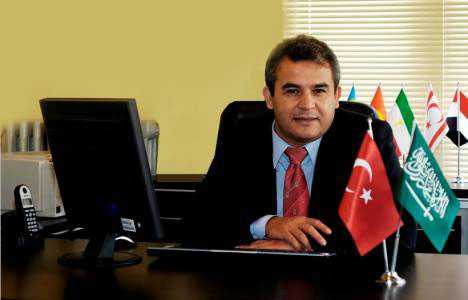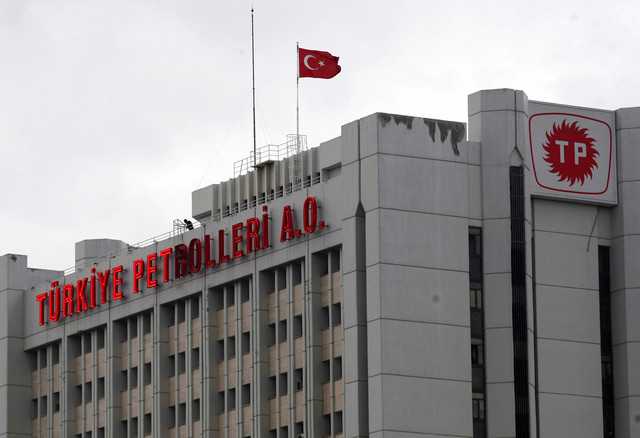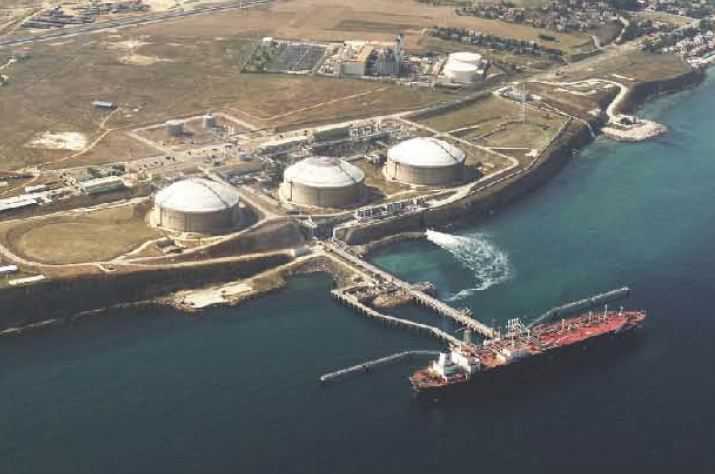Turkey is drilling for oil and natural gas with more rigs than any European country and plans new rules in 2013 to speed exploration of energy supplies for the fastest-growing major economy after China.
The country fielded 26 rigs at Dec. 31, according to data compiled by Bloomberg, and the number has since risen to 34, Energy Ministry officials said yesterday. Turkey has leapfrogged Norway as offshore drilling increased in the Black and Mediterranean seas. Spending on exploration jumped to $610 million last year from $42 million a decade earlier.
Turkish Petroleum, which is known as TPAO and has operations in Libya, Iraq, Azerbaijan and Kazakhstan, needs to boost domestic output as it pursues a target of supplying all of Turkey’s energy needs by 2023. Photographer: Adem Altan/AFP/Getty Images
With economic growth forecast at 3.5 percent this year and about twice the pace of the most advanced economies to 2017, Turkey is drilling for its own energy to ease reliance on imports from Iran, Iraq and Russia. State-owned Turkish Petroleum Corp. has taken Royal Dutch Shell Plc (RDSA) and Exxon Mobil Corp. (XOM) as partners, after neighboring Israel and Cyprus made some of the decade’s biggest gas finds in the past three years.
“If there’s one country that needs energy, it’s Turkey,” said Darren Engels, an analyst at FirstEnergy Capital in Calgary. “Their domestic business doesn’t scratch the surface.”
Turkish Petroleum, which is known as TPAO and has operations in Libya, Iraq, Azerbaijan, Colombia and Kazakhstan, needs to boost domestic output as it pursues a target of supplying all of Turkey’s energy needs by 2023.
Turkey had proved reserves of 307 million barrels of oil and gas in 2010, 88 percent of which is oil, according to FirstEnergy’s Engels. In 2011 alone, the country consumed about 258 million barrels, according to the EIA.
Rules Changing
To speed up the search for oil and gas, the government submitted a draft Petroleum Law to Parliament on Dec. 21. The bill calls for changes to “ensure speedy, continuous and efficient search of carbon resources,” requiring companies to pledge 2 percent of their projects as collateral to extend licenses, a move aimed at increasing activity and avoiding speculation on licenses.
“Our aim is to make Turkey one of the 10 largest economies in the world by 2023,” Energy Minister Taner Yildiz said yesterday in an interview. “Finding energy” will “enable Turkey to achieve its goal.”
Turkey imported about 92 percent of the oil it consumed in 2011 and 98 percent of the natural gas, according to the U.S. Energy Information Administration.
The scale of Turkey’s energy imports is swelling the current account deficit, fueling inflation and threatening to restrain economic growth.
Equal Treatment
In the past, TPAO was designated as the national company tasked with searching and drilling oil and gas reserves in the country. The draft law no longer defines TPAO as such and in theory it will be treated like any other company, Necdet Pamir, head of Energy Studies Group at Ankara-based Chamber of Petroleum Engineers, said by telephone Jan. 9.
“Foreign companies are complaining that working conditions in Turkey are not favorable for them since they have to play with rules of the TPAO, which holds exclusively all offshore licenses,” Pamir said. “Chevron for example decided to pull out after drilling the first of two wells at its own cost in the Black Sea and paid a penalty under its agreement with TPAO.”
TPAO is just one of the contributors to the domestic drilling boom. Shell, Exxon and smaller explorers such as Transatlantic Petroleum (TAT) and Anatolia Energy (AEE) are investing.
The Turkish government “is doing everything it can to attract the foreign majors,” said Timothy Ash, head of emerging-market research at Standard Bank Group Ltd.
Turkish Geology
TPAO and Shell plan to start drilling off the coast of Antalya in the Mediterranean in 2015, Yildiz said. “TPAO is also planning to drill in the Black Sea in Kuskayasi field in 2014, which was abandoned by Chevron. Obviously, it would be cheaper if it can find a partner.”
Energy officials in the ministry say the geology of Turkey, a country which is crisscrossed by active fault lines, makes it more difficult to find large reserves compared with neighbors.
The Mediterranean and Black Sea regions are more likely to hold gas, while the southern part of the country is more likely to hold oil, said FirstEnergy’s Engels.
Turkey produced 2.3 million tons of oil in 2012. The average production is 44,000 barrels a day with domestic production meeting 8 percent of overall consumption needs, according to official figures. In contrast, Norway produced about 2 million barrels of oil a day in 2011, according to BP Plc’s Statistical Review of World Energy. Russia produced 10 million barrels a day.
Perenco, Amity
TPAO’s share in production of oil at home was 69 percent in the first 11 months of 2012 with the rest divided among others such as Perenco SA, Tiway Oil AS of Norway, Amity Oil International, Transatlantic Petroleum Ltd. and Aladdin Middle East Ltd.
While the country has found little oil and gas in its territories, it’s one of the world’s big transport hubs for energy. With an area larger than Texas nestled between Europe and the oil-rich Middle East and countries of the former Soviet Union, Turkey has four major pipelines sending gas to Europe and there are plans for two more. It has four oil pipelines to bring crude from Iraq and the Caspian.
Turkey may also benefit from plans by Iraq’s Kurdistan Regional Government to build a pipeline to the north that would end dependency on Iraq’s export infrastructure, which is controlled by Baghdad authorities.
IMF Forecasts
The country’s future depends on having secure supplies of energy. The International Monetary Fund forecast Turkey’s economy will expand 3.5 percent this year, compared with 2.1 percent in the U.S. and 0.2 percent in the euro area.
In 2017, Turkey will expand 4.4 percent, while advanced economies will grow 2.6 percent on average. In 2011, Turkey was the 18th largest economy in the world and expanded faster than any other in the top 20 after China.
Turkey got about half of its oil from Iran in 2012 and is compensating for decreased purchases through imports from Saudi Arabia, Libya and Russia amid U.S. sanctions, Yildiz said.
Turkey’s contract to buy oil from Iran will “definitely be extended,” Yildiz told reporters on a plane from Libya to Qatar on Jan. 6. “Turkey now buys 35-40 percent of its oil needs from Iran, compared with 50 percent before” international sanctions against Iran.





